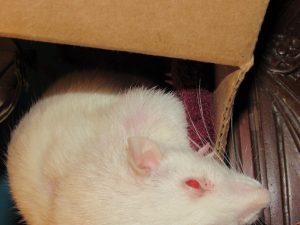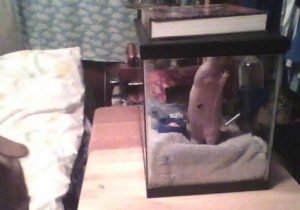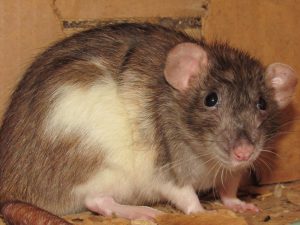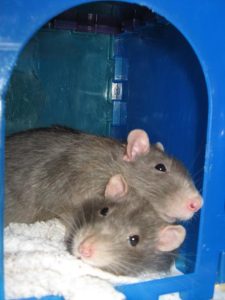I’m going to start this article with a disclaimer. The ultimate decision as to whether or not your pet needs surgery can only be made after a discussion between yourself and your vet. In writing this article, I am not implying that my choices must be yours, instead my intention is to offer insight into some situations that may require surgery and my own personal experiences in those circumstances.
As pet owners, we all want to make the right choices for our fur babies, no matter what their size or species may be. We all hope that they will live happy, healthy lives, but we know that sometimes accidents and health issues get in the way of their longevity, and when that happens, it is up to us as owners to decide on a path for the future. As a rat owner who has had to make some fairly difficult choices regarding surgery, I hope to sum up some of my experiences here so that others who end up in a similar position can take comfort in knowing that they are not alone in this journey. Again, I must emphasize that my story is not your story and the best way to make a choice on surgery is with an appointment with your veterinarian who can properly diagnose, pre-check, and discuss options that are available to you. With that being said, let’s look at some scenarios.
Cancer
The first thing every pet owner must expect when they decide to bring home their rat is that a diagnosis of cancer will most likely be in their future. Out of all of the rats I have owned, most have passed from some form of the disease, complications from it, or have had a tumor removed in order to extend their lives. The most important thing to know about the treatment for cancer is that it is the same as it is with humans: early detection. Regular, thorough petting of your rat should reveal even the slightest lump in any part of their body and if you are attentive, you can catch these lumps quickly and have a higher chance of successful removal.

Clay has developed a soft mass in her mammary area, a common location for females. She is young and healthy, so surgery is in her future.
Once the the need for surgery is determined, there are several things a rat owner should discuss with their vet regarding their options:
- Weight – The weight of your rat is one of the most important elements to take under consideration when deciding to go ahead with surgery. An obese rat or a rat that is severely underweight may have difficulty during the procedure and it is important to ask if your rat’s weight should be taken into account.
- Age – In our family, unless our rat is extremely healthy, we begin to question the safety of an operation by the time a rat is one and a half years old. Most often, we are able to go through with a surgery beyond that age, but not all rats are the same and so we discuss our rat’s age with the vet before we agree to have anything removed.
- Family History – Most pet owners don’t know the family tree of their rats, but if you are lucky enough to have some idea, there are several things to think about. Questions to ask here are: How many rats in this family have had complications from surgery? Have any rats in this family been diagnosed with a heart or breathing condition that could be genetic? How many rats in this family are or have been afflicted with severe cancer that required operations? Share known information with your vet so that they can help you make an informed decision on what step to take next.
- Location – Is this tumor in a place that is accessible through operation? Some parts of the body are easier to operate on than others, just as some parts of the body heal better than others. A tumor found in the folds of skin has plenty of excess tissue to stitch back together, where a tumor near the bone does not.
- Recovery – If all of the above are tests that your vet thinks your rat can pass, you then need to talk about recovery. There are plenty of post surgical recovery tips that I will cover in a later article, but if you are not willing or able to give all of your efforts into this recovery process, will your pet suffer more post surgery than they are now? Will their recovery be short, or will their life expectancy far surpass the recovery time involved for the procedure?
There are times when surgery is not an option, but that does not necessarily mean that the happiness of your pet is at risk or that drastic choices about their lives should be made. In some instances, rats are capable of living long lives, even while their tumors grow. Part of the decision making process must be a discussion with your vet about weighing the risks with looking at their life expectancy and quality of life without surgery.
One of our rats had cancer in the spine, which consumed the lower half of her body. Obviously surgery was not an option, however because she was paralyzed and had no feeling in the affected part of her body, our family consulted with our vet and made the decision to allow her to live her life to the fullest. Together, we monitored her pain levels and she had regular checkups and a few x-rays, but in the end she passed away from old age, not any kind of complication from the cancer itself. In another, more common example, one of our most recent rats, Lee, was not a candidate for surgery due to the combination of his age and weight, so we made the choice to let him live as he was rather than risk his health and life further by attempting to remove the tumor at his side. With regular monitoring of his condition, the option of helping him cross the rainbow bridge was available to us when we are certain it was the time, rather than in surgery.

Lee, unable to have surgery due to his age and size, lived happily for many months before euthanasia was required.
Accidents and Injuries
Though none of us want bad things to happen to our pets, we know that there are occasions when your curious little angel gets into trouble. Hairless rats are particularly susceptible to accidental injury, even just while playing with their brothers or sisters. In these cases, a pet owner often has to make the decision of making an emergency vet visit or waiting until morning for a diagnosis. The most important thing to do is monitor your rat. If you can not stop the bleeding, if they seem to be in extreme pain, or if you are worried that the wound is too deep, you will probably choose to make that after hours appointment. Some cuts, scrapes, and even gashes will be survivable overnight, but those are usually detectable only with experience. If you are ever in doubt, it is best to call the vet.
The option of surgery here varies and most of the above rules from cancer apply. It is always important to keep your rat’s age, weight and family history in mind whenever anesthesia is involved, but in these cases, location and depth of the wound are typically the most important considerations. You will be surprised how quickly a deep wound heals in your pet rat and often you will have the ability to care for them with simple pain medications and regular cleaning and monitoring of the wound.

A naked rat with a puncture wound. The bleeding stopped, so the choice was made to visit the vet during normal business hours. (Image quality reduced due to graphic nature.)
Infections
As clean as rats are, infections are still a possibility. Most of these will not require surgery, though it is possible that some may. Most often, your vet will clean the infected area, remove any dead tissue, and examine the exposed site regularly to check for signs of proper healing. These open wounds can look particularly gruesome, but it is important to remember that rats are quick to heal and, with proper care, the wound closes rapidly and without further incident. There are rare instances, however, where a choice for or against surgery must be made.
Many years ago, one of our rats, Becket, was bitten by a spider, the tissue decayed around the bite wound, which happened to be just above our poor boy’s most private area. Initially he was expected to make a full recovery with a simple cleaning of the location and non-surgical removal of dead tissue. Over the course of a week, we realized that with the affected area so dangerously close to his penis that the topic of surgery had to be discussed. This was the worst example of necessary surgery that we could possibly have imagined and we were forced to go through our list.
- Weight – Perfectly healthy for a rat his age, lean, and active.
- Age – A little closer to the cut off than we generally prefer, but after talking with our vet, we decided that our rat’s excellent health outweighed the age risk.
- Family History – One of his sisters did not recover well from surgery, however, other family members had. It was decided that the one difficulty with anesthesia was an isolated incident.
- Location – This is a VERY difficult area, with plenty of complications, however the wound was just off to the side enough that our veterinarian (who is one of the best surgeons we have ever seen) was confident that he would be able to repair the damage without causing issues with the urinary tract. On the other hand, leaving the wound to heal on its own actually exposed the urinary tract to the possibility of being severed by accident.
- Recovery – Our boy’s movement would need to be severely restricted and he would need careful monitoring to be certain that urine came out of where it was supposed to and not the surgical area. Once the wound healed he would lead a perfectly normal life, with no risk to his life at all.
Weighing everything, the choice was made to risk the surgery and our miracle worker spent one of the longest periods of his career performing one of the most complicated tasks that he had been faced with. The result? A happy, healthy boy who lived a long life with his family in our home.
The Final Choice
As far as the history of the universe goes, rats have been popular as pets for only the blink of an eye, but in that short span of time more and more veterinarians have learned how to treat these sweet, loving creatures. In the end the choice to have surgery is yours, but having that choice available brings rat owners into the same circle with many other animal lovers around the world. All of us want only the best for our fur babies, and now, with technology and research constantly expanding, more of us have the option of scheduling surgery in order to give their rat the quality of life they deserve as members of our family.
Mirrani Houpe, our Small Animal Editor, has had rats since she took home her first little boy once they both completed the second grade. Since that time she has owned, rescued and bred many kinds of rats, from many backgrounds. She may not be a vet, psychology major, or scientist, but her babies have her very well trained when it comes to how to care for them. She is constantly working with her family’s veterinarian to come up with new and innovative ways to love and care for the most often misunderstood rodent in the pet world. You can e-mail her at mirrani@yourpetspace.info



